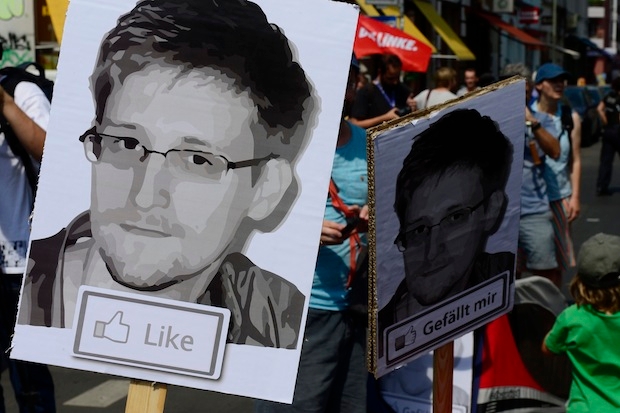Last summer a National Security Agency (NSA) contractor called Edward Snowden leaked a vast trove of secret information on the mass data-gathering of his erstwhile employer and Britain’s GCHQ. He was widely lauded on the political left and libertarian right as a principled whistle-blower. Elsewhere he was derided as a naïve enabler of America’s enemies or as a traitor. His revelations provoked outrage from South America, cold fury from Germany and a warm smile from China and from Russia — where Snowden is currently granted asylum.
The Guardian newspaper co-operated with Snowden in releasing this material, as they did with Julian Assange before him. As the author of The Snowden Files is a Guardian journalist, the book written at the suggestion of the paper’s editor and published by the paper’s publisher, it is very much the Guardian’s version of events. But Luke Harding is a fine journalist. The co-author of an earlier book on Assange, he is also sole author of an interesting, if on occasion slightly overheated, account of his troubles as the Guardian’s correspondent in Russia.
Of course certain baggage can come with this ‘spooky’ terrain. Harding has claimed that drafts of the present book were hacked by anonymous forces. I wonder if the NSA inserted some of the ‘hack-ese’ in an effort to discredit him? Before we are past the prologue we have come across ‘the Britain of James Bond’ and ‘GCHQ boffins’. Later on Skyfall and Judi Dench get crowbarred in. Other journalists are scorned for writing of spy chiefs ‘coming out of the shadows’, after Harding has used precisely that cliché himself. Elsewhere in his tale we get ‘pesky Brits’, a US Congress ‘rabid for war’ and so on.
But the meat of Harding’s story is relayed with typical and engrossing style. It includes some revealing stories, such as an account of how the American activist and Guardian employee Glenn Greenwald reacted on seeing the first tranche of Snowden’s stolen material while on a flight with a colleague:
From time to time, while the other passengers slumbered, [Laura] Poitras would come up from her seat [in coach — Greenwald apparently hates coach] and grin. ‘We would just cackle and giggle like we were schoolchildren,’ she says. ‘We were screaming, and hugging and dancing with each other up and down,’ he says.
Later, the White House engages the Guardian to try to avoid the most severe damage to national security. US agencies and White House advisers are on a conference call with the paper. Their slides do not match the Guardian’s. Janine Gibson, the Guardian’s US editor in New York, says, ‘I’m really sorry. It’s just inherently comedic when you say the words purple box.’ Harding writes: ‘From the Guardian side laughter, from the White House bemusement. It was another moment of cross-cultural confusion.’ Or just possibly, US officials did not find the largest intelligence theft in their country’s history to be an opportunity for lame humour? Elsewhere, when two men from the British security service turn up at the Guardian’s London office to ensure that intelligence materials in the paper’s possession are properly disposed of, they are derided by Guardian staff as ‘the Hobbits’.
More important charges go unanswered. The possibility that Snowden, who connected with the Guardian in Hong Kong, may have been helping the Chinese is dismissed because he once attended some ‘Free Tibet’ events. Claims that he never meant to help America’s enemies are taken at face value. The possibility that — like the Guardian — he may have no idea who he is or is not helping is not even broached. The nine-hour Heathrow detention last summer of Greenwald’s partner, David Miranda, is written up as if it were indeed a great scandal.
It is not Harding’s fault that since this book went to print the detention has been ruled lawful. But you do have to live on Planet Guardian to believe that the boyfriend of an activist journalist should be allowed to travel through British territory with thousands of stolen files relating to British intelligence and that the British authorities are the ones to have committed some outrage when they briefly detain him. It is, incidentally, noticeable at this juncture that Harding fails to report Greenwald’s notorious threat that he would make Britain ‘sorry’ for questioning his partner by releasing more British intelligence secrets.
In the end the Snowden affair highlights one divide more than any other. There are people who believe that Snowden revealed an unparalleled and outrageous intrusion into their own lives. And there are those who assume that spies need to collect information and that even if there was occasional overreach the appropriate response was not wholesale destruction of the system.
Over recent years this country and the US enjoyed an unparalleled global advantage in signals intelligence. Always likely to end at some point, that advantage was undoubtedly brought to an end last summer. Harding’s book is a fine one-sided first draft of history. Snowden and the Guardian should relish it. Because if any of the worse global competitors have learned what they should have done from this episode, then this first draft of history will be the only sympathetic one that Snowden and the Guardian are likely to get.







Comments